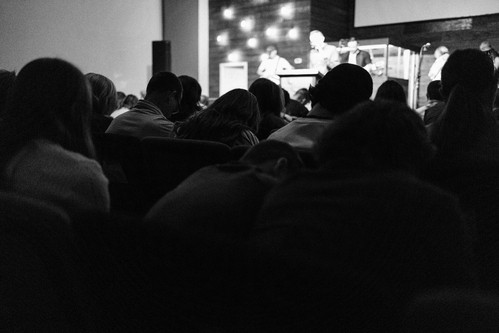March 25th, 2024
by Jacob Hancock
by Jacob Hancock
Cleanliness is Next to Godliness
by Jacob Hancock

There’s a scene in the movie “The Aviator” where Leonardo DiCaprio’s character, the businessman Howard Hughes, obsessively washes his hands in a public restroom. He scrubs his hands until the skin cracks and bleeds. Then he notices a spot on his shirt, and once more he scrubs until the spot is gone. Finally he nears the door and freezes. The camera moves back and forth between his hand, the doorknob, and his face as we see the overwhelming fear that Howard has with becoming unclean once more. He watches the door for a few seconds and slips out when another man enters the restroom, never touching the doorknob himself.
In Leviticus 11 through 20, we see a series of instructions that God has given to His people through Moses. While at first these laws may seem tedious, they actually give us an important look at what God is asking of His people during this time and, since scripture is still applicable in our lives today, what He is asking of us.
The first few chapters of this section of Leviticus may seem unconnected at first, but there is a clear throughline underlying all of them: the idea of cleanliness. Whether it be what animals are clean or unclean to the Jewish people (Leviticus 11), proper protocol after childbirth (Leviticus 12), or how to properly handle a case of leprosy (Leviticus 13 and 14), God is shown to care a lot about what is clean before Him. The heart of this idea is found in Leviticus 15:31 where God says: “Thus you shall keep the people of Israel separate from their uncleanness, lest they die in their uncleanness by defiling my tabernacle that is in their midst.” God desires to separate the people of Israel from the world around them, just as we are called to be set apart.
There is a small catch though: cleanliness is not freely obtained.
In Leviticus, the Israelites are expected to atone for their uncleanliness in various ways. Sacrificing doves and lamb for disobeying God’s laws, and in the most extreme cases, being outcast or killed for their sexual immorality. We see in Leviticus 16 that God demands atonement. Because we are sinful by nature, there must be a price paid to be close to God.
Howard Hughes, as previously mentioned, scrubs his hands so hard that his skin splits and blood drips into the sink. He quickly cleans it up and tries to return to the outside world but is stuck. He will be unclean again if he touches the doorknob, and that terrifies him. Similarly, the Israelites would become unclean again and would once more have to atone for their sins.
As Christians, we have a gift that Howard and the Israelites did not: the atoning blood of Christ. We are given the freedom to go back out into the world and live as examples of God’s grace. Jesus paid the price of our uncleanliness with His own blood, giving His life so that we don’t have to give ours. All that is requires in return is that you follow His word daily, living by His example, making the world a little cleaner in the process (see Rom. 12:1-2).
In Leviticus 11 through 20, we see a series of instructions that God has given to His people through Moses. While at first these laws may seem tedious, they actually give us an important look at what God is asking of His people during this time and, since scripture is still applicable in our lives today, what He is asking of us.
The first few chapters of this section of Leviticus may seem unconnected at first, but there is a clear throughline underlying all of them: the idea of cleanliness. Whether it be what animals are clean or unclean to the Jewish people (Leviticus 11), proper protocol after childbirth (Leviticus 12), or how to properly handle a case of leprosy (Leviticus 13 and 14), God is shown to care a lot about what is clean before Him. The heart of this idea is found in Leviticus 15:31 where God says: “Thus you shall keep the people of Israel separate from their uncleanness, lest they die in their uncleanness by defiling my tabernacle that is in their midst.” God desires to separate the people of Israel from the world around them, just as we are called to be set apart.
There is a small catch though: cleanliness is not freely obtained.
In Leviticus, the Israelites are expected to atone for their uncleanliness in various ways. Sacrificing doves and lamb for disobeying God’s laws, and in the most extreme cases, being outcast or killed for their sexual immorality. We see in Leviticus 16 that God demands atonement. Because we are sinful by nature, there must be a price paid to be close to God.
Howard Hughes, as previously mentioned, scrubs his hands so hard that his skin splits and blood drips into the sink. He quickly cleans it up and tries to return to the outside world but is stuck. He will be unclean again if he touches the doorknob, and that terrifies him. Similarly, the Israelites would become unclean again and would once more have to atone for their sins.
As Christians, we have a gift that Howard and the Israelites did not: the atoning blood of Christ. We are given the freedom to go back out into the world and live as examples of God’s grace. Jesus paid the price of our uncleanliness with His own blood, giving His life so that we don’t have to give ours. All that is requires in return is that you follow His word daily, living by His example, making the world a little cleaner in the process (see Rom. 12:1-2).
More from the blog:
Love Your Neighbor As Yourself
February 23rd, 2026
The Law of Leviticus boils down to this, and Jesus’ explanation and interpretation of the new covenant also has it at its core: Love your neighbor as yourself. This command in the 19th chapter of Leviticus is cited in three of the four Gospels as Jesus reiterates to the Jews the most important commandment - for it sums up the Law. But what I find interesting is that Jesus doesn’t seem to be tellin...
Finding the Right Foundation for Your Life
February 16th, 2026
Foundations are important. My husband and I discovered this first-hand when we were looking for our first house. The real estate agent took us to a “bargain” fixer-upper property with foundation problems. When we stepped into the house, we quickly saw that the foundation problems were indeed serious. Many of the floors were visibly slanted. Some of the doors were difficult to open. And when I plac...
Sojourners in the Flesh
February 9th, 2026
“This world is not my home, I’m just ‘a passing through.” These words open a lesser known hymn of the early 1900’s, and it seems like the sons of Jacob, and Jacob himself, echo this refrain. As the 70 persons of Jacob’s family come into Egypt, they do so as sojourners. When Pharaoh asks them what their job is, they reply, as instructed by Joseph, “Shepherds.” They go on to say, “We’ve come to sojo...
Suffering is Not Pointless
February 2nd, 2026
18 For I consider that the sufferings of this present time are not worth comparing with the glory that is to be revealed to us. 19 For the creation waits with eager longing for the revealing of the sons of God. 20 For the creation was subjected to futility, not willingly, but because of him who subjected it, in hope 21 that the creation itself will be set free from its bondage to corruption and ob...
Romans and Ratatouille
January 26th, 2026
I don’t remember a time in my life before Ratatouille. To be fair, the now-classicPixar film released only a few months after I turned 3 and I imagine I was more focused onbuilding blocks or finger painting than remembering anecdotes for a blog post I’d write 18years in the future. By the time I was in elementary school, however, the movie was already aconstant fixture in our house.If you’re unfam...
Recent
Archive
2026
2025
February
March
April
September
October
November
2024
March
April
September
October
2023
April
May
July
August
September



No Comments